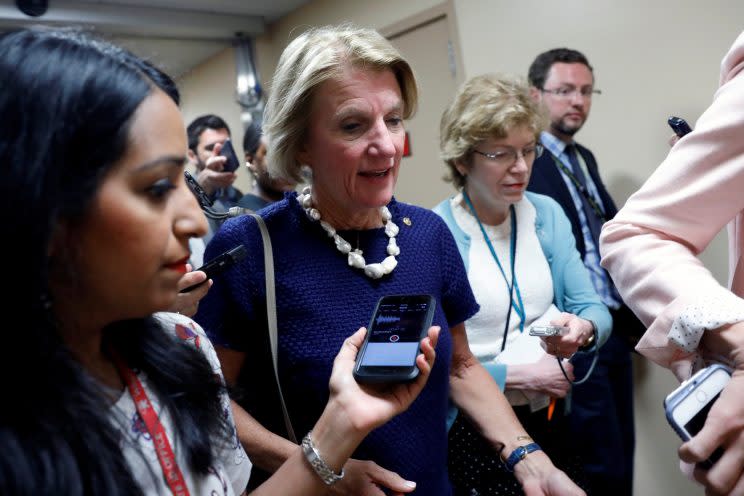The Senate GOP’s new Obamacare repeal plan is effectively dead
WASHINGTON — A plan to cleanly repeal the Affordable Care Act appears to have failed in the Senate after three GOP lawmakers said they would not vote to proceed with the latest attempt to reform the health care system.
Shortly after Sens. Mike Lee, R-Utah, and Jerry Moran, R-Kan., said Monday night they would not even vote to allow the original repeal-and-replace proposal to come to the Senate floor, Senate Majority Leader Mitch McConnell, R-Ky., announced he would scrap that plan and move forward with repealing former President Barack Obama’s signature legislation.
“I regret that the effort to repeal and immediately replace the failures of Obamacare will not be successful. That doesn’t mean we should give up,” McConnell said on the Senate floor Tuesday. We will now try a different way to bring the American people relief from Obamacare — I think we owe them at least that much.”
And though that proposal has the support of President Donald Trump, McConnell appears to lack the votes to undo the ACA with no plan to replace it — even though Republicans have been campaigning on that promise for years. They voted for the same thing two years ago, when the certainty that President Obama would veto it made it a cost-free move to please Republican voters.
But now at least three lawmakers have said they would not vote to repeal it this time around, effectively killing the proposal because McConnell can only afford to lose two members and still advance any bill.
Sen. Shelley Moore Capito, R-W. Va., quickly became the first lawmaker to come out against a repeal-only plan. Despite voting to repeal the ACA in the past, Capito said she was concerned about the effect doing so would have on her home state.
Related slideshow: Protesters across the country oppose GOP’s health care plan >>>
“My position on this issue is driven by its impact on West Virginians,” Capito said in a statement. “With that in mind, I cannot vote to repeal Obamacare without a replacement plan that addresses my concerns and the needs of West Virginians.”
Sen. Susan Collins, R-Maine, quickly followed, reiterating her past opposition to undoing the ACA.
“I do not think it is constructive to repeal a law that is so interwoven within our healthcare system without a replacement in place,” Collins said in a statement. “We can’t just hope to pass a replacement in the next two years.”
And Sen. Lisa Murkowski, R-Alaska, delivered what seemed to be the fatal blow early in the afternoon, telling NBC News that she was “not there” on the repeal-only bill.
“I said in January we should not repeal without a replacement, and just an indefinite hold on this creates more chaos and confusion,” she said.
Another potential roadblock is the procedural maneuvering McConnell needs to do to arrive at a vote to repeal the 2010 law. In a statement Monday night, he said he would bring the House-approved replacement for the ACA to the floor with the intention of passing an “amendment” that substitutes a full repeal to take effect in two years — a move designed to buy lawmakers time to devise a new system.

That amendment is the same as 2015’s symbolic repeal bill. But to even introduce it, McConnell will first have to convince hesitant senators to begin debate on the House bill, which was considered “dead on arrival” in the Senate when it passed in May.
Sen. Jeff Flake, R-Ariz., voted for the 2015 bill and said he would do so again if the amendment came to a vote, but he did not know if he would even support bringing the House bill to the floor.
“I’m still trying to understand the implications of bringing up the House bill,” Flake told reporters.
Sen. Rob Portman of Ohio did not say whether he would support the motion to proceed, but expressed concern about the uncertainty a repeal-only bill would create.
“If it is a bill that simply repeals, I believe that will add to more uncertainty and the potential for Ohioans to pay higher premiums, higher deductibles. So we’ll see,” Portman said.
Senate Majority Whip John Cornyn, R-Texas, earlier said he was unsure whether leadership had the support to bring the House bill to the floor, but implied that they would move forward with a vote in any case.
“We will find out,” Cornyn told reporters. “One of the purposes of having a vote soon is to find out where the votes are and where we go from there.”
The timetable for that vote is unclear, however. The GOP majority is reduced for at least this week, with Sen. John McCain, R-Ariz., recovering at home after surgery to remove a blood clot.
There is virtually no chance Democrats will side with Republicans to repeal the ACA, and many members have blasted the proposal, which previous estimates have said could leave as many as 32 million Americans without insurance in coming years.
Read more from Yahoo News:

